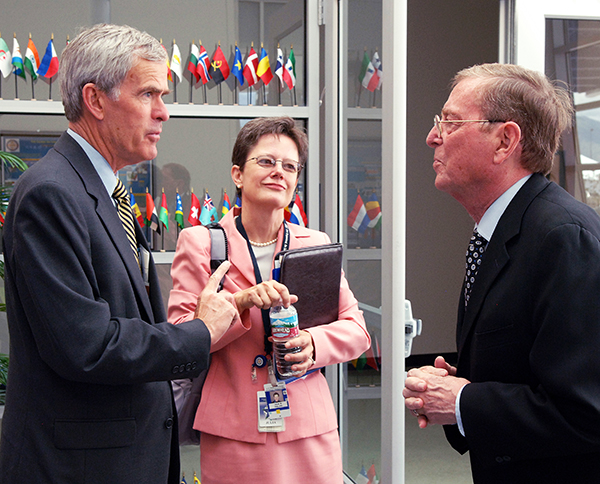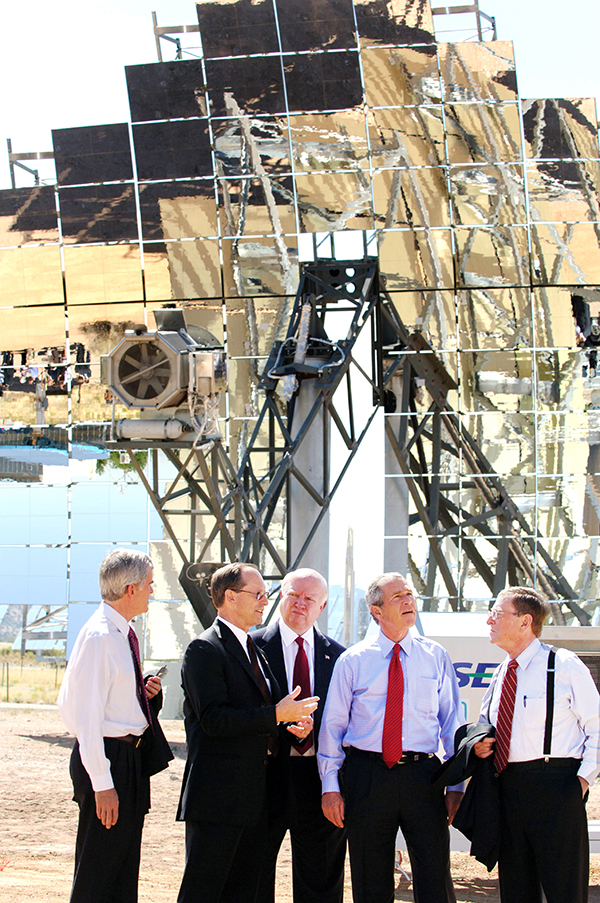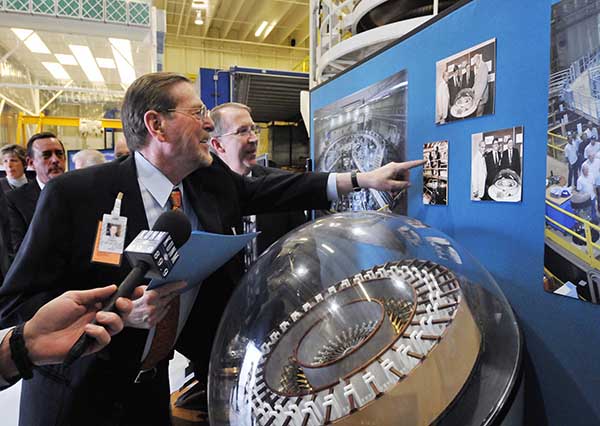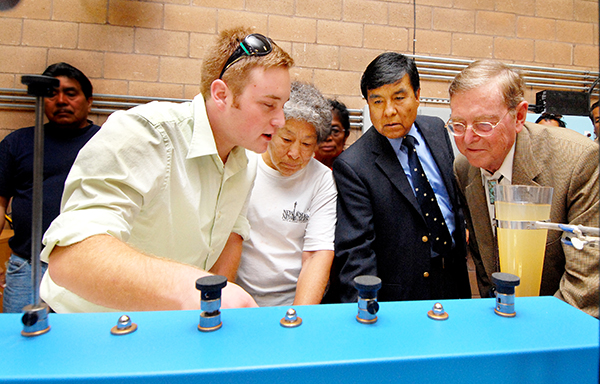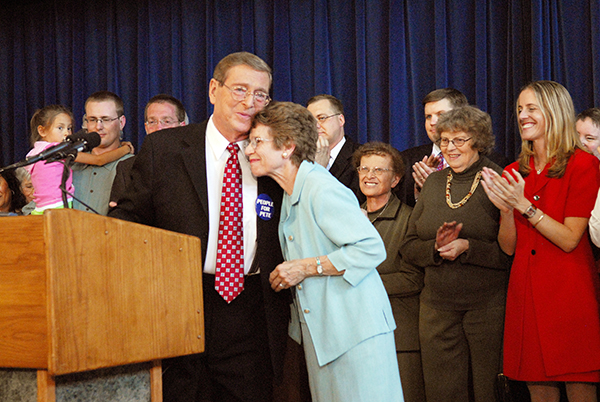Ambassador C. Paul Robinson was Sandia President and Laboratories Director from 1995 to 2005. He previously served as head of delegation and chief negotiator for the United States in successful arms control talks with the Union of Soviet Socialist Republics. In his roles as Labs Director and ambassador, Paul worked closely with Sen. Pete Domenici, widely respected among his peers as perhaps the most knowledgeable lawmaker in Congress on matters related to nuclear weapons, science, and technology. In the essay below, Paul shares some thoughts about his friend and associate, Sen. Pete V. Domenici, who passed away Sept. 13.
A remembrance of Sen. Pete Domenici
Sen. Pete Domenici’s leadership in New Mexico, in Senate and congressional committees, and in the full Senate are well-known and have been widely remarked upon both during his career and in the many tributes about his passing. In this brief note, I want to emphasize how and why he was able to realize so many accomplishments of profound national importance.
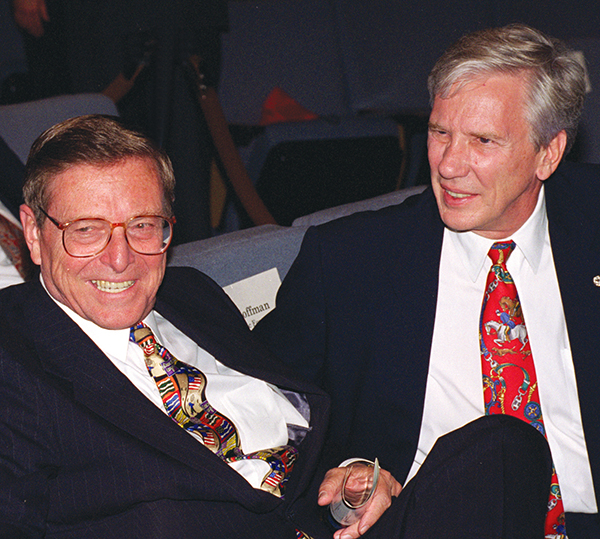
Throughout his career, Sen. Domenici cultivated close ties to Los Alamos National Laboratory and Sandia National Laboratories, becoming arguably the best-informed national legislator on the complex issues of science and technology for national defense and nuclear energy. His openness to learning and understanding new things and the uncommon common sense that he brought to difficult technical issues made him the natural leader on these subjects in the US Senate.
Over the years, as he moved into the powerful posts of chairman of the Senate’s Energy and Water Development Subcommittee and then chairman of the Senate Energy and Natural Resources Committee, he became the most important legislator for all things nuclear.
Sen. Domenici’s access to some of the nation’s best physicists, engineers, and other scientists gave him a stable of instant advisers on many difficult issues. He established advisory groups (especially between Los Alamos and Sandia) to brief him, keep him informed, and help him develop the best answers for tough questions.
Very early in his career, Sen. Domenici learned that you must get the science right. In fact, he became quite outspoken on what he called “pure silliness” — that is, when unproven scientific theories are used to foster fear in the populace.
He took on several of these, such as the public hysteria over eating irradiated foods, a technology that if deployed could prevent most of the 5,000 deaths that still occur each year from food-borne diseases (e.g. e coli). He often pointed out that “all of the astronauts’ food is irradiated to help ensure they don’t get sick in space!”
As Sen. Domenici’s knowledge, reputation, and stature grew, he became the leader in Congress on strategic deterrence issues. He often negotiated with presidents of both parties over these tough issues, and was frequently brought in by US presidents to help advance sensitive Summit discussions. Although he didn’t like to travel, these discussions often required Sen. Domenici to travel to Moscow to break deadlocks over vital issues. He played a particularly important role in helping rescue the uranium and plutonium disposition agreements between the US and Russia. As a result of his personal leadership, today more than half of the uranium fuel used in US nuclear power plants comes directly from retired Russian nuclear weapons (with more than 25,000 weapons disposed of), by the US buying these materials. The programs Sen. Domenici created are modern classics of “forging swords into plowshares” and have been transformational to the wider world.
Sen. Domenici also often provided key leadership on major national security issues here at home. He provided critical insights for issues that: involved nuclear weapons and their delivery systems; involved the institutions that designed and developed them; developed the policies for their deployments; and provided the funding that sustained them. He deserves enormous credit for his leadership on these issues throughout his tenure. Few outside the nuclear weapons programs know the debt of gratitude the nation owes Sen. Domenici for his devotion to, and effective leadership of, this vital work. His superior knowledge on the issues, coupled with his well-earned reputation for prudence in spending taxpayer moneys, gave Sen. Domenici’s views even greater weight.
I encourage young people in our nation to study the model of national service which Sen. Domenici’s life exemplified, and I would hope that those students would then seek to become (or at least elect) senators like Pete Domenici. As I always said: “He became the prototype of what we all should want in a United States senator.”
A transformative experience at Sandia
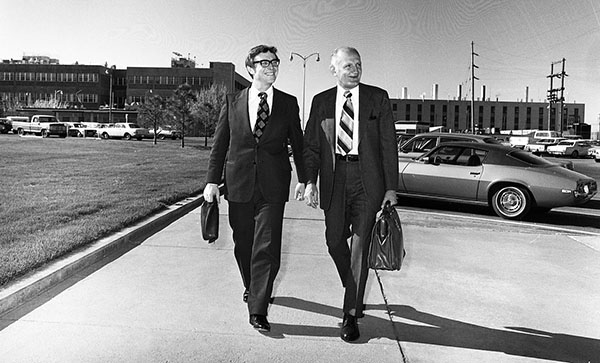
Pete Domenici was a great American and in my relationship with the senator he was a man who cared very deeply for our nation and gave seemingly more than 100 percent each day to his work on its behalf.
From the very first time I met him it was clear to me he was driven by a tireless desire to help shape a better future — for state and nation alike. He worked very hard on each issue and always asked tough questions about long-term results: “Where do you think this could lead? Tell me if you think I’m taking the right view of this?”
He was devoted to improving the future for all.
Once, on one of his visits to the Laboratory, (with the prior consent of our highest DOE official, who would be coming along with Pete on the visit to Sandia), I got approval to “read-in” Sen. Domenici
into one of our closely held programs. The senator’s reaction was transformative: “My God, I knew you people did important work, but I never could have guessed that it was something like this.”
In the years that followed, he would remind me of how thankful he was that we had communicated such information to him, saying, “I always held you folks in high esteem, but I take so much more pride now in knowing in how valuable you can be to all of us — and knowing what it really meant to have supported you so strongly over the years.”
That is the memory of “St. Pete” that I will always carry. — C. Paul Robinson
